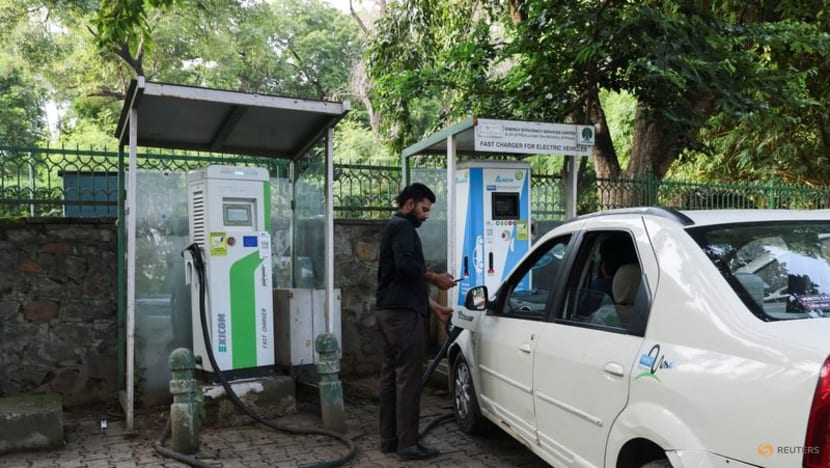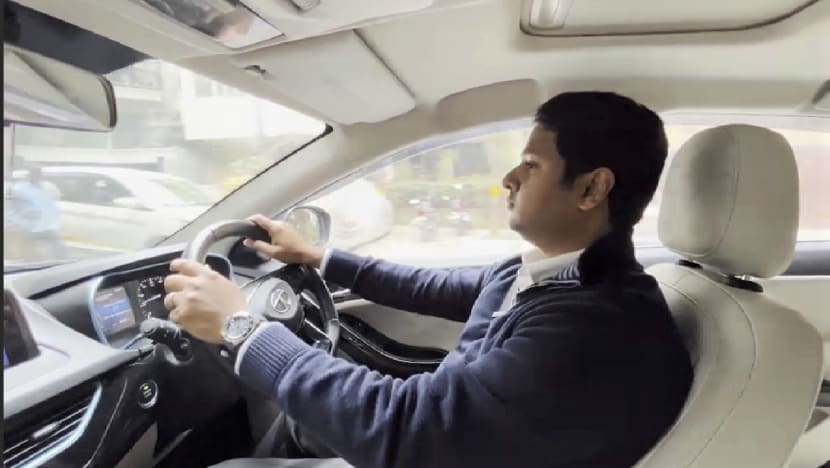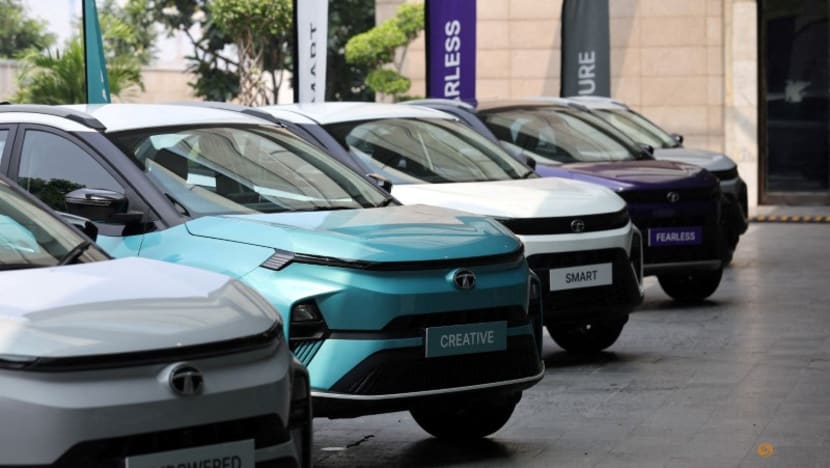Asia
New Delhi has more than 4,000 public and semi-public charging stations, and is on track to set up 18,000 EV points by 2025.

FILE PHOTO: A man plugs an electric car at a charging station in New Delhi, India, August 11, 2023. REUTERS/Anushree Fadnavis
New: You can now listen to articles.
Sorry, the audio is unavailable right now.
Please try again later.
This audio is AI-generated.

NEW DELHI: India’s capital New Delhi is leading the way with the adoption of electric mobility in the country.
The local government has made major strides in transitioning public and commercial vehicles to zero emission modes of transportation.
However, some residents are finding it hard to switch gears to electric vehicles (EV) for personal use.
ENCOURAGING ADOPTION OF EVs
Last year, personal electric car sales in New Delhi jumped by 46 per cent from 2022.
The city’s government said its new electric mobility policy, which allows EV users to benefit from subsidies and reduced road taxes, has enabled this surge.
New Delhi has more than 4,000 public and semi-public charging stations, and is on track to set up 18,000 EV points by 2025.
Two years ago, resident Shouryendu Ray bought an electric car, in addition to his fuel car. The mileage he gets out of it is about 200km on a single charge.
It costs him less than US$6 to fully charge his electric car at home, around a tenth of the cost to fill up his petrol car to a full tank, which can last him about two weeks.
“Our electricity bill has increased but only marginally. It is not a huge increase,” he said. “It is like perhaps adding a couple more air conditioners in the house.”

Two years ago, New Delhi resident Shouryendu Ray bought an electric car, in addition to his fuel car.
Mr Shouryendu said it takes four hours to get his Nexon EV, a sport utility vehicle produced by India’s iconic carmaker Tata Motors, fully charged.
Charging his EV at home is as easy as charging his phone, he added.
“The manufacturer has given us an option between a rapid charger and a slow charger. We have opted for a rapid charger. It charges quickly,” he said. “There are also charging stations located quite conveniently at malls (and) shopping complexes.”
His Nexon EV, which costs nearly US$22,000 two years ago, is among the most popular and affordable personal green vehicles on Indian roads, according to market watchers. Today, the same model has gone up in price, costing about US$1,000 more.
Currently, there are two Indian carmakers that produce EVs. Compared with foreign brands, they are a cheaper option for Indian consumers.

FILE PHOTO: Tata Motors’ Nexon and the electric vehicle Nexon.ev are seen parked for display outside a hotel ahead of its launch in New Delhi, India, September 14, 2023. REUTERS/Anushree Fadnavis/File Photo
HESITANCY TOWARDS EVs
Still, EVs remain more expensive compared to their combustion engine counterparts.
For instance, a cost-conscious consumer can purchase the fuel version of the Nexon for about half the price of the EV model.
The cost of the battery makes up the bulk of the price of an EV, so cheaper batteries could make such vehicles more affordable.
India relies heavily on imports for batteries for electric cars, most of them coming from China and Taiwan, but the government is reportedly considering an incentive plan to boost domestic production of batteries.
Ms Moushumi Mohanty, head of electric mobility at New Delhi-based research and advocacy organisation Centre for Science and Environment, said the government should be looking “not only at capacity building, but also at capability building, where research goes into developing technologies that work for India.”
There remains some hesitancy about EVs, even among those who have bought one.
Some electric car owners are worried that the battery could fail after the warranty period expires.
Another concern is whether it would be difficult to find EV charging points in other parts of the country.
Delhi Transport Minister Kailash Gahlot said: “Right now what I hear is that the biggest problem is range, and other adjoining states and adjoining places not keeping up pace with Delhi.
>>> Read full article>>>
Copyright for syndicated content belongs to the linked Source : ChannelNewsAsia – https://www.channelnewsasia.com/asia/why-new-delhi-residents-are-finding-it-hard-switch-electric-vehicles-personal-use-4064961











